The 9 Best AI Answering Services by Industry in 2025
Updated on
Published on
When a Missed Call Becomes a Missed Opportunity
Last year, two people in my network hit the same problem from opposite sides. One runs a family dental clinic; the other manages reservations for a popular downtown restaurant. Both were losing customers. One to unanswered calls during business hours, the other to missed weekend voicemails. The solution wasn’t more staff. It was the right AI answering service for their industries.
The dental clinic needed HIPAA-aware appointment booking that integrated with their EMR. The restaurant needed high-volume call handling that could take waitlist requests without interrupting front-of-house. Each found a tool purpose-built for their sector, and both saw results within weeks.
That’s the point: there’s no one-size-fits-all solution. But there is a right AI answering service for your industry and this list will help you find it.
Top 3 Quick Picks: 2025’s Best AI Answering Services
- Rosie AI: Best for Businesses in Any Industry
- 24/7 intelligent phone answering
- Industry-specific scripting support
- CRM integration and lead routing
- Slang.ai: Best for Restaurants and Hospitality
- Reservation and waitlist automation
- Handles peak hour call volume
- Real-time updates and tone control
- Frontdesk: Best for Health and Wellness Providers
- Booking and appointment reminders
- HIPAA-aware conversational flows
- Syncs with Mindbody and Jane
Keep reading for full reviews, pricing context, and the ten key filters that actually matter when choosing the right AI answering partner.
How to Choose the Right AI Answering Service
1. Define What “Answered” Actually Means
This isn’t just semantics; it’s operational reality. Some AI answering services act as a full replacement for a receptionist, handling everything from intake to scheduling without human support. Others only field basic queries before transferring to a live agent. The right choice depends on your call complexity, compliance needs, and how much of the process you actually want to automate.
2. Match the Tool to Your Industry
Different sectors demand different types of conversations. A patient calling a medical clinic expects discretion and accuracy. A customer calling a salon might want a last-minute appointment or gift card information. Look for services with pre-built knowledge and workflows tailored to your sector.
3. Prioritize Integration
No matter how smart the AI is, it’s a bottleneck if it can’t pass data to the right place. The best services integrate with CRMs, booking platforms, ticketing tools, and even internal alert systems. Without these connections, your staff ends up retyping notes or forwarding messages, defeating the purpose of automation.
4. Determine How the Tool Handles Edge Cases
Every business gets questions that don’t fit a script. A customer might mention a last-minute cancellation, an insurance claim, or a client account issue that needs nuance. What does the AI do when it’s unsure? Some platforms freeze. Others escalate smartly based on trigger words or confidence scores.
5. Measure Contextual Intelligence
Most services can recognize keywords, but the best ones go further. They understand context. That means recognizing when a client wants to “move my appointment to next week” and updating it, not canceling it. In law firms, it could mean distinguishing between a prospective client and an urgent follow-up.
6. Evaluate the Time to Value
Time to value isn’t just about setup; it’s about speed to operational benefit. If your business has seasonal spikes, think tax firms in Q1, HVAC services in the summer. You don’t have six weeks to onboard. Look for services that offer quick-start templates, dedicated onboarding support, or instant deployment through integrations.
7. Understand the Pricing Model
Cost structures vary widely. Some charge per call, others per minute, and others use flat-rate models based on volume tiers. It’s easy to underestimate usage, especially if you’re growing or have sudden peaks. Look carefully at overage fees, support tiers, and what’s included in the base price.
8. Look at Escalation Rules
What happens when a call can’t be resolved by AI? In sectors like legal, healthcare, or emergency services, escalation needs to happen fast and intelligently. Check how each platform handles these transitions. Can it recognize urgency based on tone or language? Does it escalate via SMS, Slack, or live call transfer?
9. Assess Tone Control
Your AI should sound like your brand. That doesn’t just mean “not robotic”, it means having the ability to shift tone depending on the caller and context. A finance firm might need a confident and professional tone; a wellness clinic may benefit from warmth and reassurance. Look for tools that let you adjust language models, scripting preferences, and even voice options so that callers feel they’re speaking with someone aligned to your business.
10. Check Workflows After the Call
The value of automation comes from what happens after the call. Does the service send transcripts? Update records? Tag the lead and assign follow-up? In industries like real estate or consulting, where calls often result in actionable tasks, these workflows are what connect voice automation to revenue. Choose a platform that doesn’t just end the call; it closes the loop.
The 9 Best AI Answering Services by Industry in 2025
- Rosie AI: Best AI Answering Service for All Industries
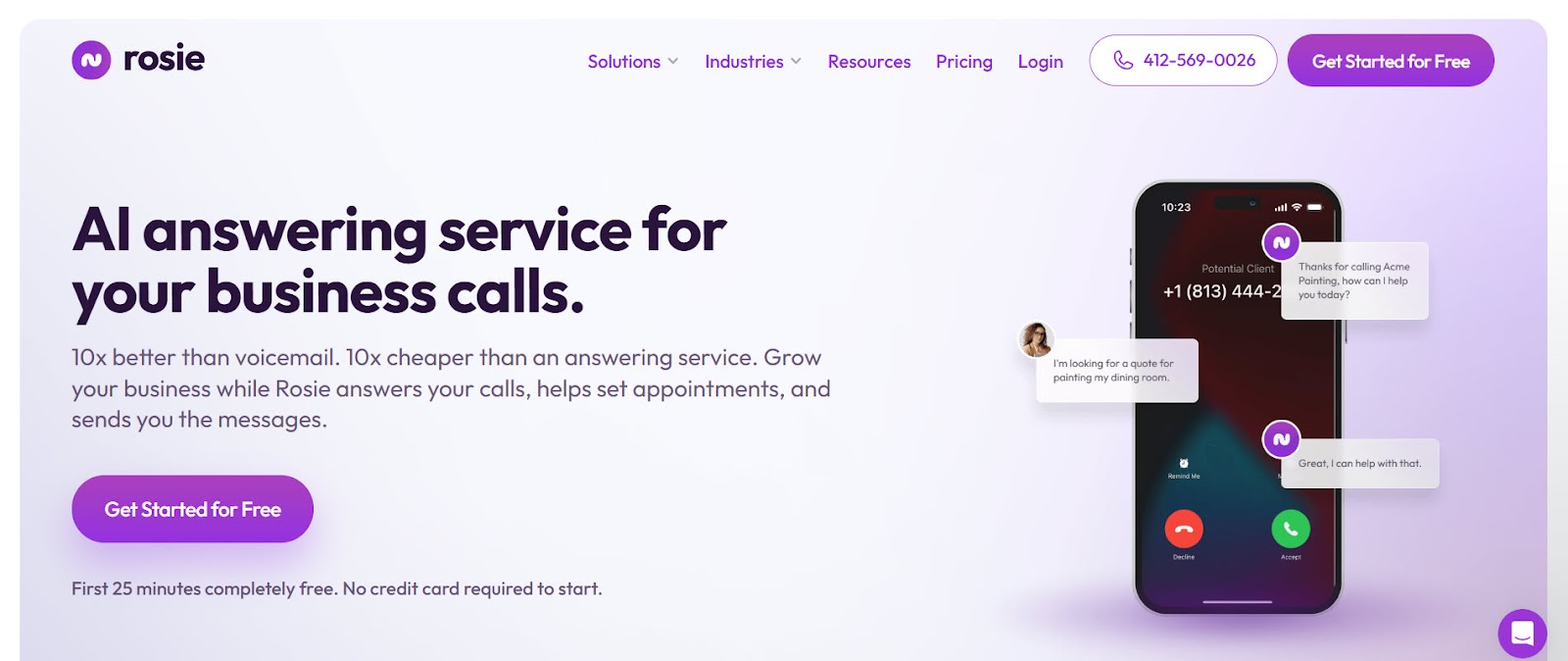
- Founded: 2024
- Headquarters: Remote
Why Rosie AI is the best AI answering service for businesses in any industry:
Rosie AI stands out for its ability to adapt to nearly any operational environment. Whether you're running a med spa, managing a legal practice, scheduling HVAC calls, or fielding inbound leads for a marketing agency, Rosie’s AI is trained to handle industry-specific nuance. It supports 24/7 answering, integrates cleanly with tools like HubSpot, Pipedrive, and Calendly, and lets teams customize tone, escalation rules, and call workflows with minimal setup time. With Rosie AI, you don’t need a different vendor for every department, just a smart system that’s flexible enough to handle all of them.
- Slang.ai: Best AI Answering Service for Restaurants and Hospitality
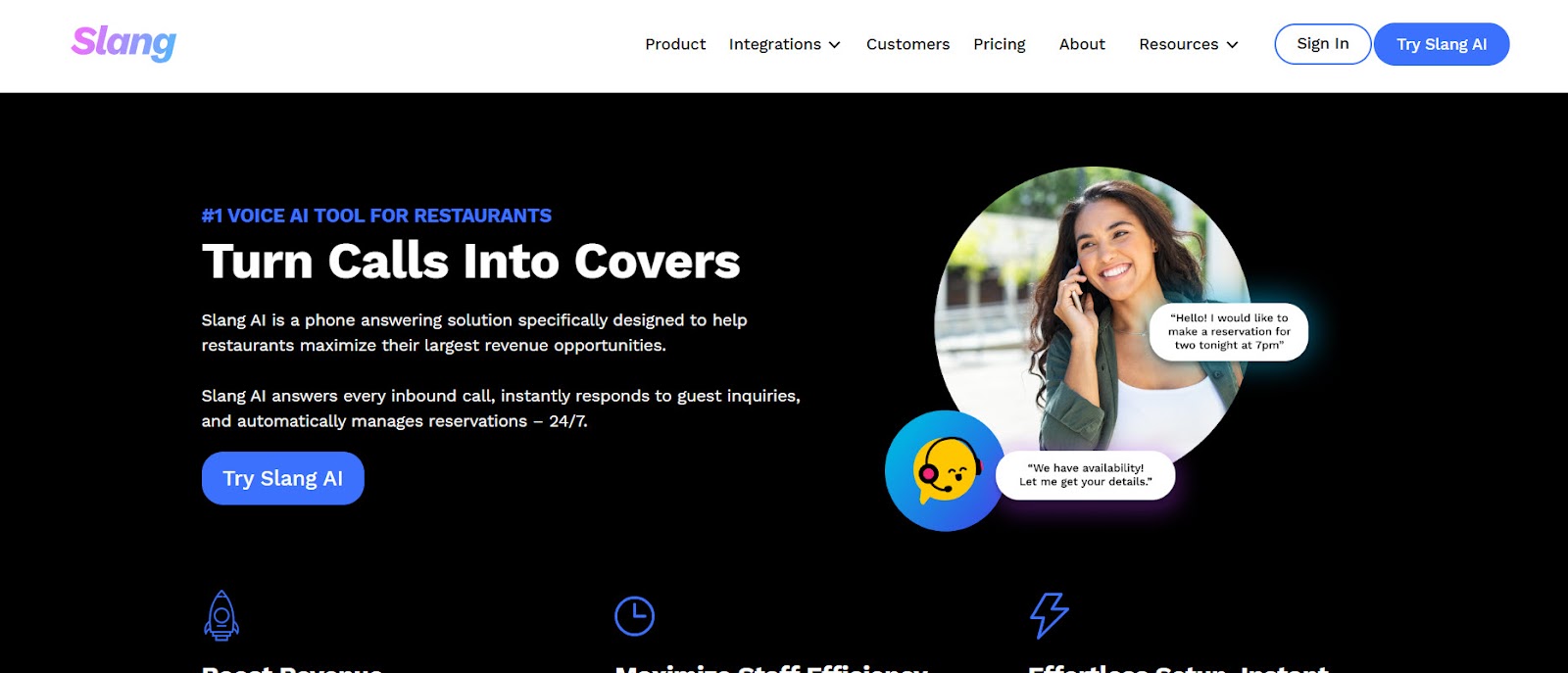
- Founded: 2020
- Headquarters: New York, NY
Slang.ai is tailored to businesses that rely on reservation volume, rapid turnover, and phone-heavy customer interactions. Its AI is built to handle high call volume, automate waitlists, manage reservations, and provide up-to-date answers to frequent questions like hours or location. Slang also gives businesses tone customization, so responses stay brand-aligned. For restaurants, hotels, and other hospitality businesses that often miss calls during peak hours, Slang.ai reduces staff burden without compromising service.
- Frontdesk: Best AI Answering Service for Health and Wellness Providers
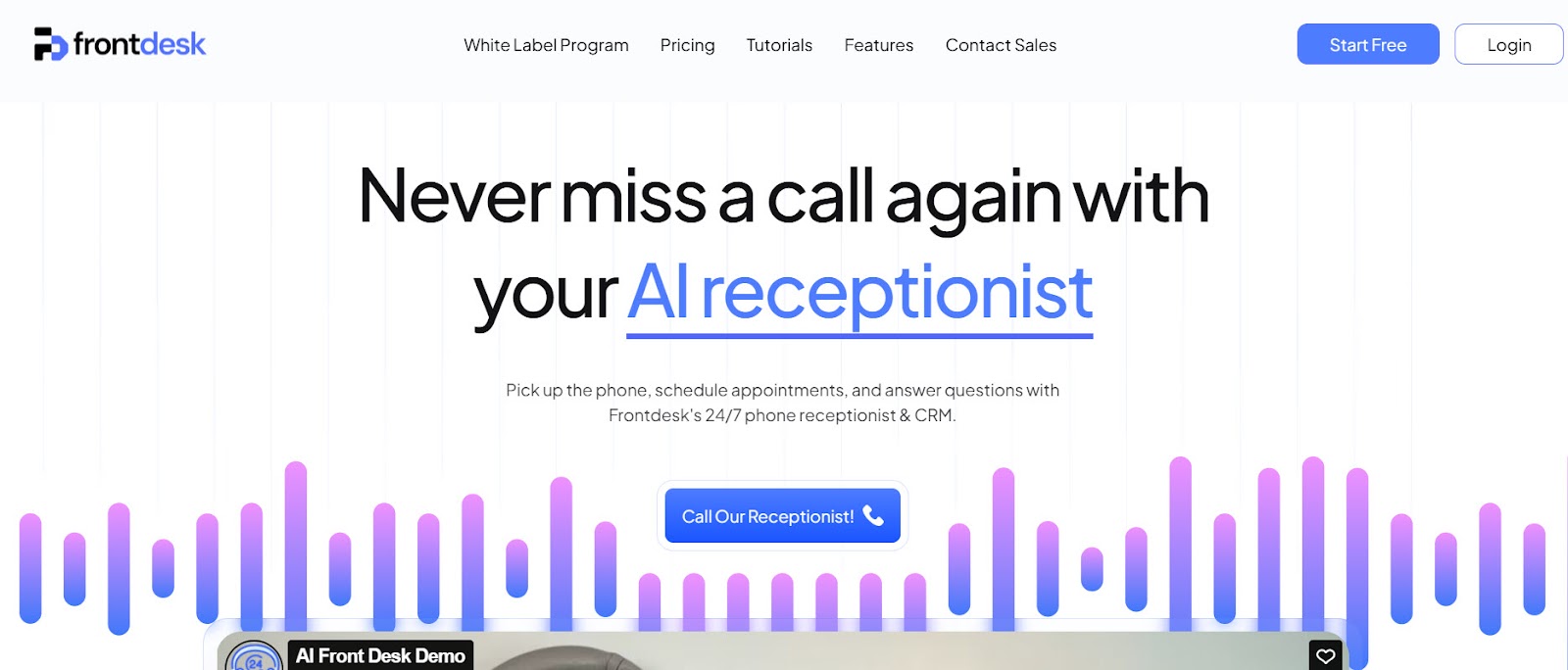
- Founded: 2023
- Headquarters: New York, NY
Frontdesk is optimized for appointment-heavy service businesses like dental clinics, chiropractors, med spas, and wellness studios. It supports HIPAA-conscious dialogue flows and can handle appointment scheduling, confirmations, and basic inquiries. Its integrations with platforms like Mindbody and Jane streamline client management without requiring new workflows. If you’re a solo provider or small clinic tired of chasing voicemails and reminders, Frontdesk makes call handling effortless and reliable.
- DeepScribe Voice AI: Best AI Answering Service for Healthcare and Clinics
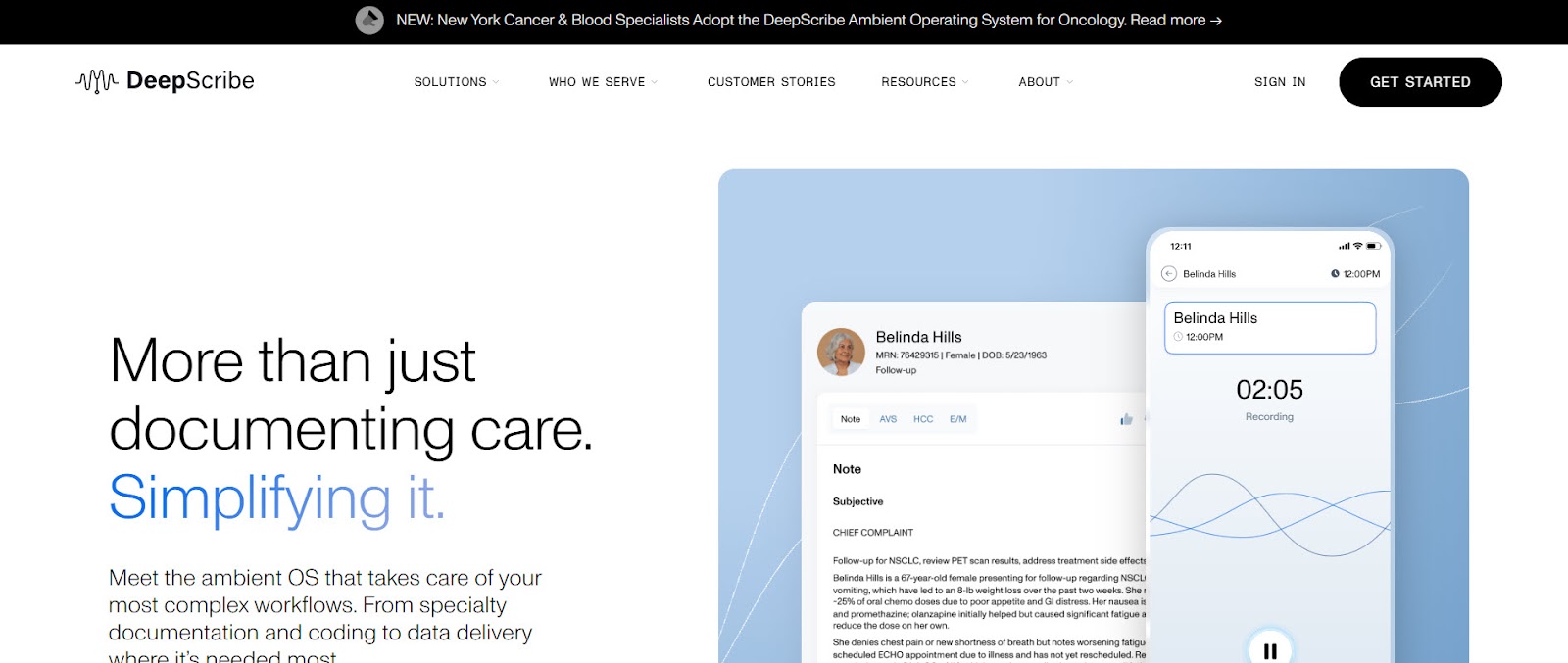
- Founded: 2017
- Headquarters: San Francisco, CA
DeepScribe offers an advanced voice AI platform that handles medical conversations with clinical precision. Designed specifically for the healthcare sector, it integrates seamlessly with major EHR systems, ensuring that call data and patient interactions flow directly into clinical records. DeepScribe supports HIPAA-compliant, context-aware dialogues, enabling it to field appointment scheduling, pre-screening, insurance queries, and post-visit follow-ups—all without human intervention. What sets it apart is its medical-grade NLP engine, which understands nuanced health-related language and escalates appropriately. For growing practices that want to optimize patient communication while maintaining compliance and care quality, DeepScribe delivers both automation and clinical trust.
- Tidio: Best AI Answering Service for E-commerce and DTC Brands
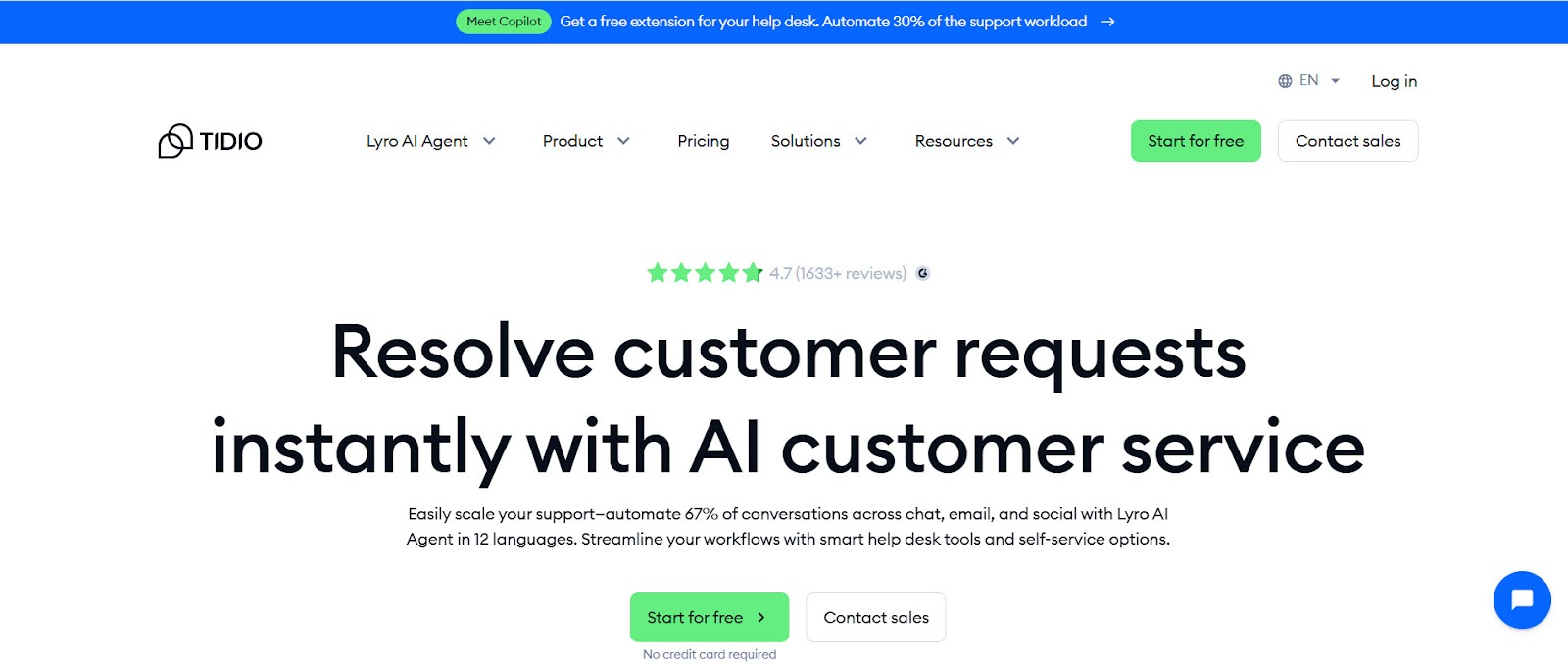
- Founded: 2013
- Headquarters: San Francisco, CA
Tidio merges chat, chatbot, and voice automation to help online stores manage customer service at scale. It covers order status, FAQs, returns, and sales questions through a single conversational interface. Built-in integrations with Shopify, WooCommerce, and other e-commerce platforms make setup straightforward. For stores looking to reduce cart abandonment or scale customer support without hiring, Tidio is a well-priced, effective option.
- Nexa: Best AI Answering Service for Contractors and Field Services
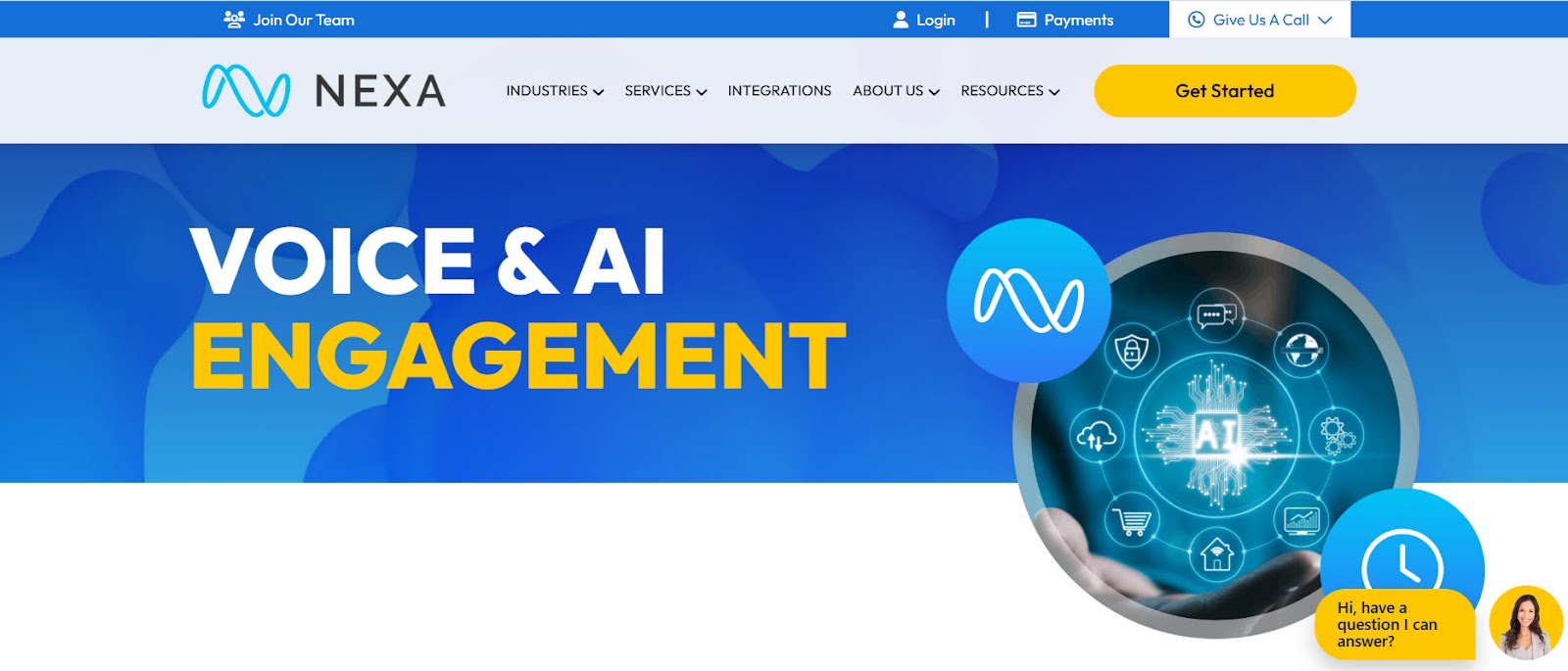
- Founded: 1982
- Headquarters: Phoenix, AZ
Nexa offers a mix of AI and live agent support designed for businesses that depend on dispatch and real-time lead capture, like HVAC services, plumbing, roofing, and pest control. It handles calls after-hours, during busy windows, or in high-volume seasons, with intelligent lead routing and urgent call escalation. It integrates with field service CRMs and provides real-time notifications to keep teams moving. Nexa shines when every missed call is a lost job.
- AnswerConnect: Best 24/7 AI Answering Service

- Founded: 2002
- Headquarters: Portland, OR
AnswerConnect is a hybrid service that combines always-on AI support with live human agents for escalations. It’s a fit for companies that operate across time zones or require overnight and weekend call handling, like legal, finance, or property management firms. Their team works with businesses to build custom call scripts and escalation logic, ensuring no opportunity is missed, no matter the hour.
- Ruby: Best AI Answering Service for Boutique Agencies
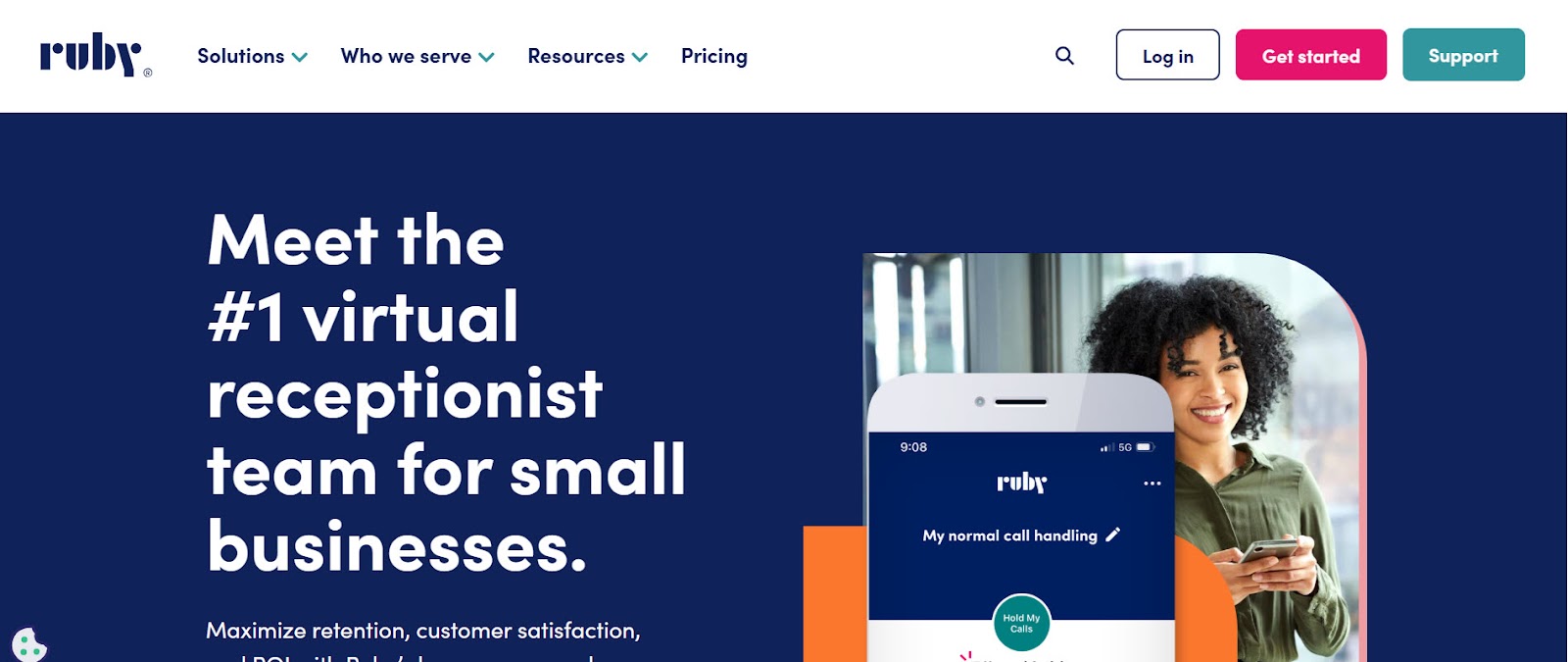
- Founded: 2003
- Headquarters: Portland, OR
Ruby is known for delivering personalized, branded call handling that’s perfect for consultancies, design firms, law offices, and other boutique agencies. The blend of AI and real human support ensures clients and prospects receive consistent, white-glove treatment. Ruby supports custom greetings, detailed call routing, and follow-ups, with an emphasis on tone and customer experience, ideal for firms that see every call as a touchpoint worth perfecting.
- Air AI: Best AI Answering Service for Sales Teams
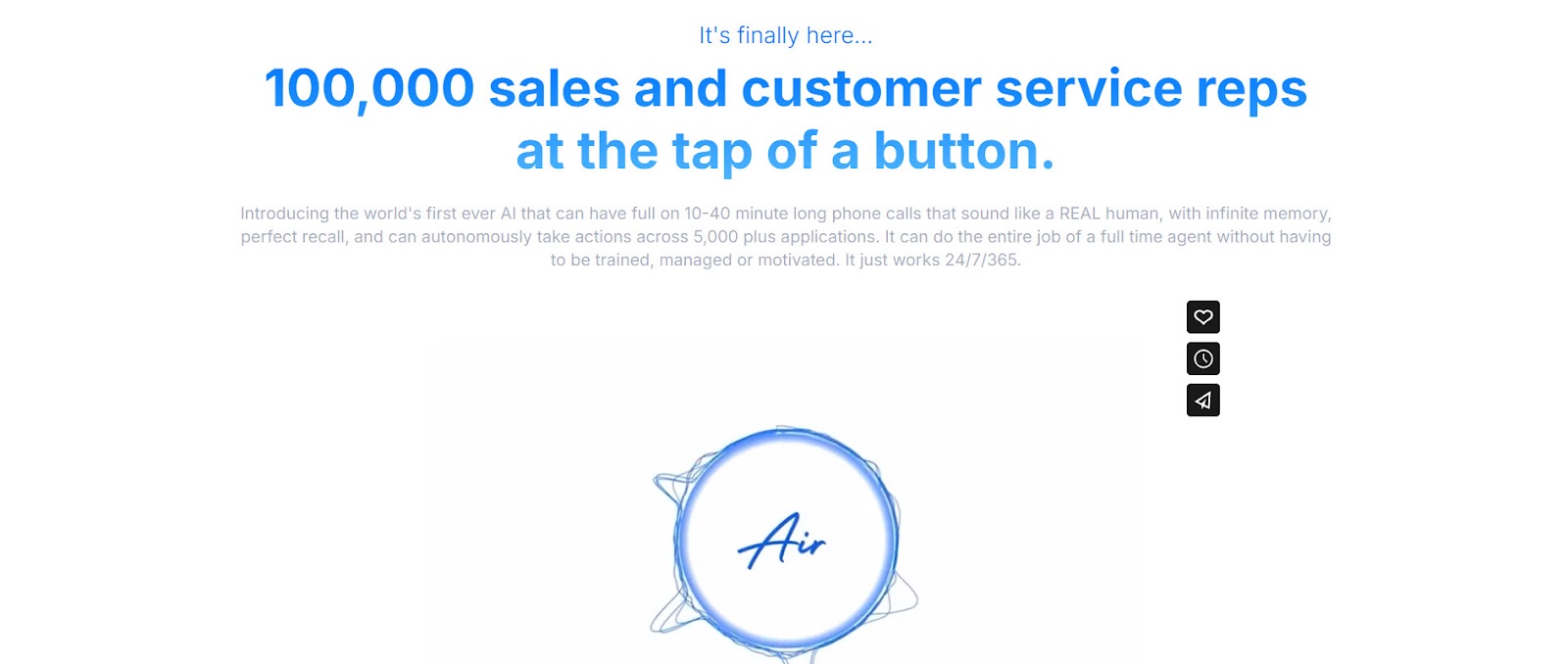
- Founded: 2023
- Headquarters: Remote
Air AI pushes the boundaries of voice AI by simulating full sales conversations that can last five to ten minutes. It’s a powerful tool for sales-driven teams that need consistent, immediate outbound follow-up, whether that’s qualifying leads, handling callbacks, or booking demos. Air AI learns and improves with every interaction, and is ideal for startups and revenue teams looking to scale outreach without adding headcount.
Choose the AI Answering Service That Matches How You Actually Work
AI answering tools aren’t just about saving time; they’re about saving business. Whether it’s keeping a client from walking, surfacing a hot lead, or freeing up your team from repetitive admin, the right system plugs revenue leaks you didn’t even know you had.
Use the list above to guide your shortlisting, but let your operations be the filter. Match the tool to your volume, workflows, and response demands. When done right, these tools don’t replace people; they make them more effective where it counts.

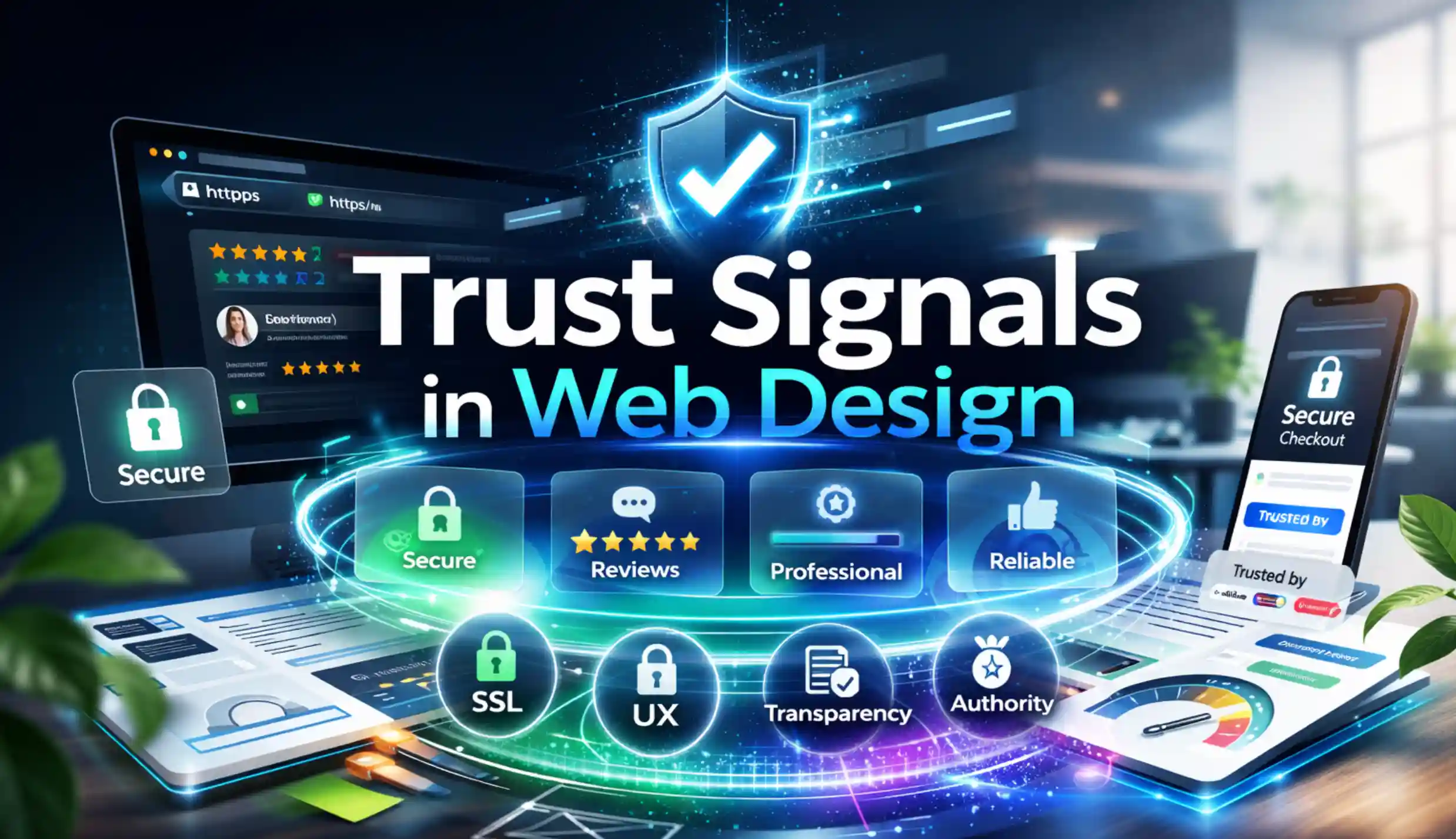

webp.webp)
webp.webp)




